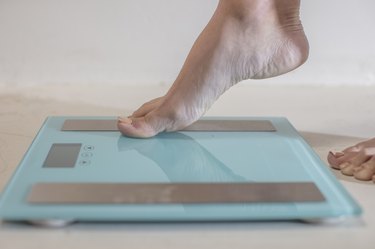
It's frustrating to lose weight but gain body fat. If you're wondering how this can happen, it has to do with the delicate balance of calorie restriction and exercise expenditure. Tweaking your diet and ramping up physical activity will help you lose weight and build lean muscle mass.
You might lose weight but see an increase in body fat percentage because your diet changes and exercise routine might be causing you to store more fat, lose water and burn sugar (glycogen stores), not body fat.
Video of the Day
Video of the Day
Read more: What's a Healthy Body Fat Percentage?
Why Body Fat Goes Up
A key goal of weight loss is to improve your overall health and help prevent illness, such as diabetes, high blood pressure and high cholesterol, according to UCLA Bariatric Surgery. The health benefits start to kick in after losing as little as 5 percent of your body weight if you have overweight.
But weighing less does not necessarily equate to having a lower percentage of body fat. That's because your body doesn't always go into fat-burning mode when you cut calories, and that can mess with your body composition.
"When you lose weight by reducing your total calories and eating less, most of that preliminary weight is diuresis through water and depletion of your glycogen stores [stored sugar in the muscle and liver]," says Sharon Zarabi, RD, CDN, program director at Katz Institute Women's Health at Northwell Health in New York City. You see a loss on the scale, but you may have skewed your percentage of body fat higher, she says.
If you stay on a very low-calorie crash or fad diet, you could start to lose muscle and even bone, according to the Academy of Nutrition and Dietetics. This can alter the balance of fat to fat-free mass even further.
To start burning fat stores, you need to add exercise to a healthy weight-loss plan. "If body fat loss is your goal, then you have to be training hard," Zarabi says. "Crank up the intensity of your workouts, and be sure to include both strength training and cardiovascular activity."
How you divvy up the calories on a restricted diet could also promote body fat. "There is a misnomer that all calories are created equal… but excess body fat is indeed impacted by the excess carbohydrates — sweets, juice, bread products," Zarabi says.
What's more, trans fats (as opposed to the healthy fats found in plants, nuts and seeds) disrupt hormones and fat storage, she says. Though the U.S. Food & Drug Administration banned trans fats in foods, they can still be found in small amounts in some packaged foods under the term "partially hydrogenated oils."
And then there is alcohol. "Alcohol is another culprit to added body fat," Zarabi says. "Not only is it high in calories but, in excess, it can lower testosterone levels, which is a hormone that helps burn body fat and will force the metabolic pathway to switch gears and limit the calories to be used as fuel. Alcohol converts to acetate in the body, which is used in place of fat for energy."
So, it pays to get nutrient-dense calories from whole foods, rather than from sweets, alcohol or processed foods.
If you are not achieving your body-composition goals, Zarabi recommends consulting with an experienced certified trainer and dietitian to help you put together a plan to help you lose weight and body fat.
The Basics of Body Composition
One of the most commonly used tools to calculate healthy weight is body mass index (BMI), which measures body fat based on your weight and height, according to the Harvard T.H. Chan School of Public Health. To calculate BMI:
- Divide your weight by your height (in inches)
- Divide the result by your height (in inches)
- Multiply the result by 703
You can also use our handy online BMI calculator. Your results will indicate if your weight is considered in the underweight, normal, overweight or obesity categories.
Keep in mind that BMI calculations are rough estimates and sometimes faulty. For example, an extremely muscular person (like an athlete) can appear to have a high BMI because of their muscles, not their body fat, according to the Centers for Disease Control and Prevention.
With the help of a trained expert, skinfold measurements and bioelectrical impedance analysis (BIA) can also be used to calculate body fat percentage, per Harvard Medical School.
- National Heart, Lung, and Blood Institute: “Calculate Your Body Mass Index”
- UCLA Bariatric Surgery: “How to Lose Weight”
- Sharon Zarabi, RD, CDN, program director, Katz Institute Women's Health at Northwell Health, New York, New York
- U.S. Food & Drug Administration: “Final Determination Regarding Partially Hydrogenated Oils (Removing Trans Fat)”
- Harvard T.H. Chan School of Public Health: “Measuring Body Fat: Body Mass Index (BMI)”
- Academy of Nutrition and Dietetics: “Staying Away From Fad Diets”
- Harvard Medical School: “Should I Know My Percentage of Body Fat?”
- Centers for Disease Control and Prevention: “About Adult BMI”